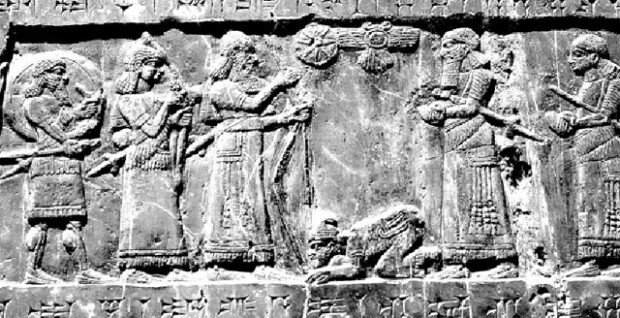‘King of Justice’
‘King of Justice’
Posted April. 10, 2018 07:44,
Updated April. 10, 2018 07:44

Assyrian kings carved the walls in the royal palaces depicting the scenes of their main battle. The great conquerors such as Ashurnasirpal II, Tiglath-Pileser lll, Sennacherib and Ashurbanipal featured the stone relief on the walls. The art depicting battle scenes are somewhat shocking as they plainly illustrate their atrocities, including plunder, killing of prisoners, and forced migration. What is more shocking is the content of documents.
The kings of Assyria boasted their contributions in wars and chronicle by erecting a monument or documenting them in cuneiform writing and distributing them to empires. The inscription depicts how they treated rebels more vividly than paintings. They skewered the body of the enemy with a pole and skinned kings or leaders and hung them over the rampart.
People were shocked when the cuneiform writings were translated and disclosed to the public in the late 19th century and early 20th century. “That Nineveh people” became an expression to refer to a semi-civilized, bloodthirsty and brutal ruler. To be sure, some might say that the behavior of imperialists in the 20th century was not different.
Which country was the cruelest in the history of mankind is a foolish question. War makes everyone cruel. It does not distinguish the winner or loser. The winner is not a person who is more brutal, but a person who had more opportunity to become brutal.
Every Assyrian king described himself a “king of justice.” They said they were able to provide their people with justice, rest and bountiful life as a result of their cruel acts. The real lesson the history teaches us is that the more a group or a country gets brutal, the more it justifies its act. There is no such thing as “just violence.” Nevertheless, beliefs in and acts of “just violence” have not disappeared until the 21st century. Why is it so? It is because of that narrow belief and impatience that justice can be implemented easily and quickly if unjust factors are removed.
Headline News
- N. Korea launches cyberattacks on S. Korea's defense companies
- Major university hospital professors consider a day off each week
- Italy suffers from fiscal deficits from ‘Super Bonus’ scheme
- Inter Milan secures 20th Serie A title, surpassing AC Milan
- Ruling and opposition prioritize spending amid tax revenue shortfalls







